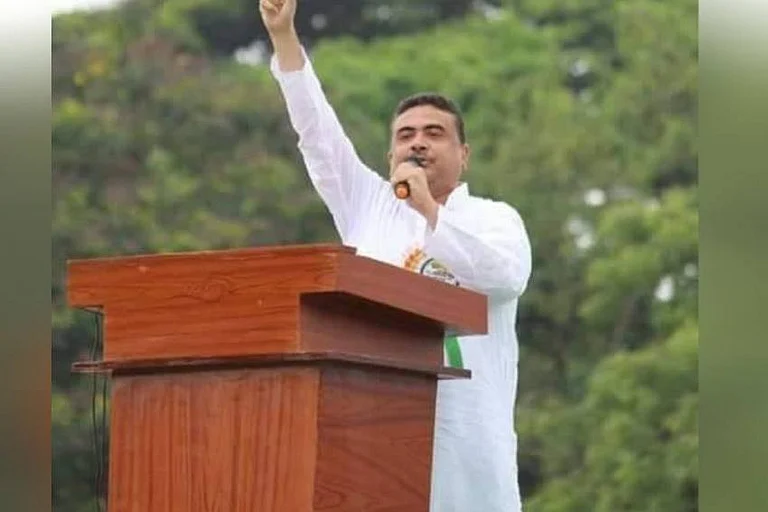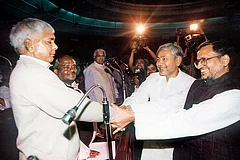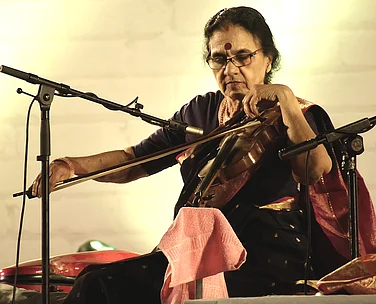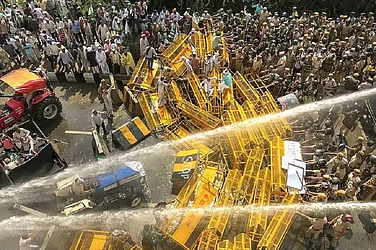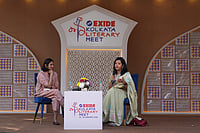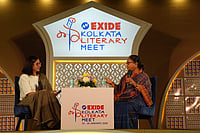There was a family where the man used to lie a lot, which made his wife feel ashamed. Before a train journey, as the wife was feeling uncomfortable, the husband said, “Alright, if I lie too much, pretend to cough. I will get the signal.”
During the journey, a fellow passenger asked the man where he was going. He said he was going tiger hunting. The fellow passenger, surprised, asked if he had been tiger hunting before. The husband said, yes. The other man asked how big the tiger was. The husband said its tail itself was of the length of 12 arms.
The wife coughed. The husband corrected himself, saying it could also be 10 arms’ length, as he did not measure it. The wife coughed. The husband corrected himself again, saying the tail could also be eight arms long since he had not measured the animal. The wife coughed again. Now, the husband was livid. He shouted, “You may die coughing, I am not going to reduce the length anymore.”
That’s Modi for you!
This is from a Bengali joke retold by West Bengal Chief Minister Mamata Banerjee during an election rally in Raidighi, South 24 Parganas district, on May 24.
That day, she was in the mood to ridicule Prime Minister Narendra Modi. She started by referring to Odisha’s Bharatiya Janata Party (BJP) leader Sambit Patra’s May 20 remark that Lord Jagannath is Modi’s devotee. Though Patra later clarified that it was “a slip of the tongue”, and that he intended to say Modi is Lord Jagannath’s devotee, opposition politicians picked up the issue.
Patra’s statement, incidentally, was followed by Modi’s own claim that he was convinced his birth was not biological, and God had sent him with a purpose.
At the Raidighi rally, Banerjee offered to build a temple for Modi. “Modi and his workers are saying Lord Jagannath is his devotee. My God! Shouldn’t such a Gurudev, a God greater than our Gods, have a temple for himself?” she said. “We will build a temple, keep your (his) photo, offer sweets, flowers and basil leaves, apply sandalwood paste on it, and even employ a priest. Do one mercy for us, stop bringing all this into politics.”
Taking jibes at Modi for his alleged use of the teleprompter while delivering speeches has been one of Banerjee’s favourites since the 2019 electoral campaign.
Mocking Modi for his ‘biological’ remark, she said, “Today, he is saying his birth is not biological. This means he has no parents. He came from the sky. He claims to be God-sent. Good heavens! There should be a limit for telling lies!” She then narrated the aforementioned joke about the man lying about killing a tiger. The audience burst into laughter.
Throughout the campaign, Banerjee brought up many issues to make fun of the man running India with an iron hand since 2014. Taking jibes at Modi for his alleged use of the teleprompter while delivering speeches has been one of Banerjee’s favourites since the 2019 electoral campaign. She loves contrasting her ‘impromptu speeches’ with Modi’s ‘assisted speech’.
This time, she pointed out that the PM had not faced a press conference in a decade and dared Modi to hold a joint press conference with her. She said Modi may have his teleprompter and as many officers as required to assist him. She will be alone. “Journalists will freely ask their questions. You (Modi) will give your answers, I’ll give mine,” she said.
After the BJP alleged in an advertisement that she utters Hindu mantras wrongly, she dared Modi to compete with her in chanting mantras. Modi neither knows any mantra nor understands Hinduism, she said. “Let him come on the same dais with me. I will explain to him who Ramakrishna and Swami Vivekananda are.”

Banerjee also took digs at Modi for his criticism of eating non-vegetarian dishes during Hindu religious festivals. Food is a sensitive issue. In West Bengal, the overwhelming majority of Hindus are fish and meat eaters and non-vegetarian food is an integral part of major festive occasions, including Durga Puja and Kali Puja, the biggest ones. Criticising non-vegetarianism was likely to elicit negative responses.
Banerjee was referring to a speech Modi had delivered in Udhampur of Jammu and Kashmir in April. He must have tried to cater to the northern and northwest Indian Hindu upper caste and trader caste population, many of whom are either pure vegetarians or consume vegetarian food during religious festivals. But this gave Banerjee an opportunity to depict Modi as a man having conflicting interests with Bengalis.
“These days, he has been telling people not to have fish, meat and eggs. What should people eat then? Mushrooms? Tell him to gather those,” she said at a rally on May 14.
The Trinamool Congress (TMC) chief insisted that food was everyone’s individual choice. “This land belongs to everyone,” she said and quoted the early 20th century songwriter-music composer Atul Prasad Sen’s legendary song, “Nana Bhasha Nana Mowt Nana Poridhan, Bibidher Majhe Dekho Milon Mohan” (India is a huge melting pot of different languages, faiths and clothes).
“Some love dhokla, some dosa and idli. Between roti, paratha, rice and biriyani, each has her/his favourite,” she said. She then started naming non-vegetarian dishes and invited Modi—a vegetarian—to taste any of them. “Some love prawn curry with pointed gourd, some love prawn curry with sponge gourd and some prefer the dish prawn malaikari. I urge Modi to taste one of these. Should I cook for you? I am giving my word, I’ll cook myself,” she said. The audience laughed.
At another rally the following day, she alleged that non-vegetarian food was not only essential for nutrition, especially for pregnant women, but cooking non-vegetarian dishes also takes less time in the kitchen than preparing vegetarian thalis.
“In a non-vegetarian meal, you only need one fish, meat or egg curry (to have with rice). But in a vegetarian meal, you need lentil soup, vegetarian curries and fries and so on. Does he want women to survive on barley and mushrooms?” she asked. When she loves the Gujarati dish dhokla, why can’t Modi love Bengal’s fish, she asked. She alleged that non-vegetarian food was being disallowed in parts of Gujarat.
Calling the PM a liar was at the core of her electoral campaign in 2024. She targeted the BJP’s key campaign slogan ‘Modi ki Guarantee’. “He pretends to be a saint. He speaks of recovering black money every time the elections are round the corner. Even Yamraj has a status!” she said, while addressing a rally in south Kolkata ahead of the last phase of polling.
According to a senior television journalist who closely followed Banerjee’s campaign, her aggression against Modi was of the same intensity as in the 2014 and 2019 Lok Sabha elections and the 2021 assembly polls, but the approach had changed. “There was less use of harsh words and more of ridicule in 2024. She tried to bring down Modi’s larger-than-life image by making fun of him,” says the journalist.
According to a senior TMC leader, it would be wrong to say that Banerjee had any plan in particular to ridicule Modi. “Of course, certain strategies are developed ahead of the campaign, issues to highlight and traps to be avoided. But she has always been impulsive. Her speeches are impromptu. She raises issues spontaneously,” says the leader.
Udayan Bandyopadhyay, a political scientist at Bangabasi College in Kolkata, says the biggest change in 2024 was how it turned the TMC’s campaign into a Bengal-centric one. “Banerjee mostly focused on her government’s welfare schemes. She turned the election into one on which the state government’s survival and the fate of its welfare schemes depended,” says Bandyopadhyay.
He adds that Banerjee spoke less on Modi and his government, but when she did refer to him and the Centre to criticise it, the anger of 2019 was no longer visible. “This time, she tried more to turn Modi into a laughing stock.”
However, since Banerjee’s speeches are, after all, impromptu, they are not always under the control of any pre-determined strategy. During the early phase of the campaign in April, she used the swear word ‘sala’ while criticising Modi for having his photos on ration bags. She corrected herself instantly, withdrew the word and apologised. “Sorry, I got angry. Anger should be controlled,” she said.
This, though, was not the first time she used ‘sala’ during her speeches. She did it while criticising the BJP leaders during an event in Kolkata in November 2014; she said it in 2019 while chasing a group of BJP supporters taunting her with Jai Shree Ram chants at Bhatpara in North 24-Parganas; and, she said it while addressing an election rally in Patharpratima in South 24 Parganas district in March 2021. She apologised in 2014, but not on later occasions.
Similarly, such a spontaneous reaction led her to trigger one of the biggest controversies in the 2024 electoral campaign. Several TMC leaders were surprised and shocked when Banerjee targeted “a section of monks” involved with Hindu missionary organisations like the Ramakrishna Mission, the Bharat Sevashram Sangha and the ISKCON.
Politicians in Bengal dare not criticise these organisations in public, considering their huge following and global repute. Though Banerjee later clarified that she did not criticise the institutions, but only individuals in these organisations, hardly any other politician would have risked naming these organisations. In her attempt to strike a balance, she also gave a list of aid, or favours, that these institutions received from her government.
It would be wrong to attribute the TMC’s success story entirely on campaign strategies. The key was the party’s ability to mobilise the beneficiary base.
Multiple observers saw Banerjee’s statement as a veiled threat to the institutions, warning their top leadership against allowing individuals to canvas for the BJP.
“I completely agree that no other politician would have taken this risk. Surprisingly, it did not hurt her electorally at all,” says a leader of the West Bengal BJP.
The BJP had high hopes that Banerjee had handed them a potentially strong weapon by publicly criticising these institutions. Modi had urged voters to hand the TMC the harshest possible punishment for insulting Bengal’s famed Hindu missionary institutions. However, despite a full-fledged attempt by the Sangh Parivar, the electoral results do not reflect any adverse impact on the TMC.
Banerjee targeted monks in a speech during a rally in Arambag, a constituency largely perceived to be tilting towards the BJP. In the end, the TMC managed to retain the seat. The Sangh Parivar had organised a protest march by saffron-clad monks in north Kolkata, but the TMC comfortably won the Kolkata Uttar Lok Sabha seat. The party’s performance was quite impressive in the phases after she stirred the controversy.
According to Biswanath Chakraborty, a political scientist at Rabindra Bharati University in Kolkata, it would be wrong to attribute the TMC’s success story entirely to campaign strategies. The key was the party’s ability to mobilise the beneficiary base.
“She was depending on three vote banks. First is the beneficiary vote bank. Her party, with the help of the political consultancy firm, I-PAC, managed to mobilise the beneficiaries of her government’s welfare schemes and succeeded in drawing them to the polling booths. She supplements this core support base with Muslim polarisation and liberal Hindu consolidation,” says Chakraborty.
MORE FROM THIS ISSUE
He agrees that the 2024 campaign saw a reduced intensity of personal attacks between Modi and Banerjee as compared to past electoral campaigns. “Modi did not launch any personal attack on Banerjee, but labelled all sorts of blame on the TMC party and the government, particularly on corruption. However, Banerjee, apart from targeting the Modi government and the BJP for depriving Bengal and inducting corrupt politicians, also tried to ridicule Modi on different occasions,” says Chakraborty.
(This appeared in the print as 'How Didi Took On Modi')







